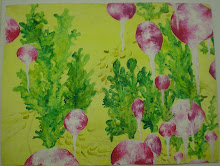On my first day I got a list of
forty names.
To pick up from their classrooms.
To do this job right I'd need hours, or days, but I have 10 minutes.
There is no time to make this a safe transition.
Clutching little tentative hands, holding little weeping shoulders.
wanting to make it okay, its okay, little strangers.
I don't know anything about you to know why you're reacting so intensely.
I know I'm another strange adult telling you where to go,
after a long day of strange adults telling you where to go.
How do I tell you I'm different, and am I?
I'm going to trust you, so we're going to like each other. But now there's no time.
firmly grasping their tiny hands, pushing the undersides of their backpacks down the hall
all I have to offer is an empathetic smile, crouched down to their eye level.
Its like herding cats down the hallway
these two swinging their clasped hands
this one dragging his backpack, that one dropping her coat.
one grabs each of my hands, one runs out front, one speeds back in the opposite direction.
There are other lines of children, and teenagers, and parents, and teachers.
They are looking at me and they are moving faster and quieter and in straighter lines.
I am so frustrated! My little masses breed anonymity.
I think or maybe yell at them: what is so difficult about being quiet and staying in line?!
Quickly I learn: there is always a reason
that catatonic little body in room 214 is afraid of the bathroom, so hasn't peed all day.
one's streaming tears are for his father, who some days gets off work in time
to pick him up early from after school to play chess, but not today.
She runs back down the hall because she forgot the leather jacket her mother just bought her
He drags his backpack because he was teased all day, he is weary and ashamed.
This one punches all the little Russian girls and wanders,
That one speaks openly of violence and greed- he's 5.
I don't know the reasons yet, but someone will.
Children aren't ghosts, they're full people.
What if all the teachers knew that its the system that's flawed, and the kids aren't to blame?
As weeks go by I often think: kindergarden is torture
yesterday they were all rain-drenched from a field trip with a backpack full of fresh picked apples and a pumpkins bigger than their head- they lug and skid them in my direction, this self-sufficiency is beyond them. Would it really be so hard for the parents to be allowed back up in to the classroom at the end of each day, so they didn't have to move their things up and down stairs?
When I share stories of tantrums and meanness the parents say
it's just that by the afternoon, they're so tired. she hasn't figured out how to eat lunch in 20 minutes yet, up until he went to kindergarden he always took a nap.
I assure them that their child isn't the only one.
Where is the optimism in this? Why have two months go by and I don't dread my job?
Because I know being an administrator means trouble-shooting: I spend much more time fixing the few problems than witnessing the many small joys.
Because a good education, or a good life, is not one where a person is always happy. That my children cry and scream and punch and crumble does not mean the school is bad, it means they feel comfortable expressing their feelings.
Because I am strongest in the face of some perceived injustice, and increasingly I see schooling this way.
Because children are beautiful, trusting and resilient. They smile and they crawl in my lap and clutch my arm, and let me hold their heads and waists and shoulders when they are serious or sad.
Because I am learning to do hard things that are useful, and which I will do better for the rest of my life for having done this job this year.
Because I believe that I am good at this work, and that there is such a thing as a transcendent educator, and that learning to be this is the same as learning to be the best version of myself.

.png)

